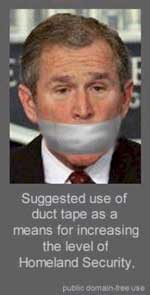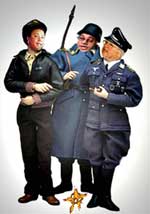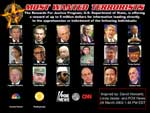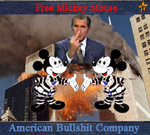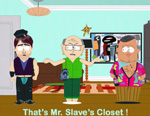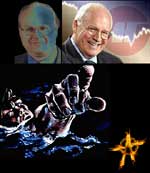Masters of War
by Bob Dylan
Come you masters of war, You that build all the guns, You that build the death planes, You that build the big bombs, You that hide behind walls, You that hide behind desks, I just want you to know I can see through your masks.
You that never done nothing', But build to destroy, You play with my world, Like it is your little toy, You put a gun in my hand, And you hide from my eyes, And you turn and run, farther, When the fast bullets fly.
Like Judas of old, You lie and deceive, A world war can be won, You want me to believe, But I see through your eyes, And I see through your brain, Like I see through the water, That runs down my drain.
You fasten the triggers, For the others to fire, Then you set back and watch, When the death count gets higher, You hide in your mansion, As young people's blood, Flows out of their bodies, And is buried in the mud.
You've thrown the worst fear, That can ever be hurled, Fear to bring children, Into the world, For threatening my baby, Unborn and unnamed, You ain't worth the blood, That runs in your veins.
How much do I know, To talk out of turn, You might say that I'm young, You might say I'm unlearned, But there's one thing I know, Though I'm younger than you, Even Jesus would never, Forgive what you do.
Let me ask you one question, Is your money that good, Will it buy you forgiveness, Do you think that it could, I think you will find, When your death takes its toll, All the money you made, Will never buy back your soul.
And I hope that you die, And your death will come soon, I will follow your casket, In the pale afternoon, And I'll watch while you're lowered, Down to your deathbed, And I'll stand over your grave, Until I am sure you are dead
The Draft, Again
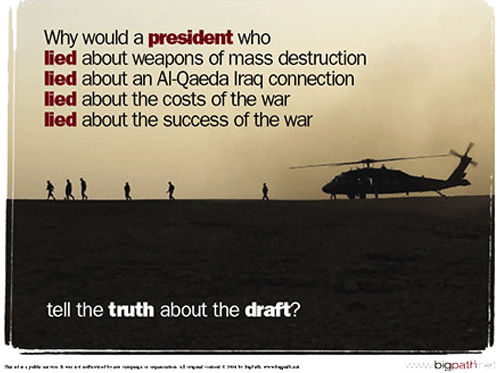
http://blatanttruth.org/draft.php
On national security and the Security of
the World
Linda Zoblotsky
Just a few thoughts on the state of religion and national security in the United States -
The United States of America is the biggest supporter of Israel in the world today.
John Hagee of San Antonio, Texas chairs a group called Christians United For Israel (CUFI) which believes that the U.S. must unite to launch a pre-emptive strike against Iran to precipitate Armageddon, followed by the more desirable Second Coming of Jesus. John Hagee is associated with high profile neocon Republicans, i.e. Ed Gillespie.
Today belief in "end-times" prophecy is common among Americans - i.e. "Left Behind", www (dot) LeftBehindProphecy (dot) com, over 50 million copies sold and then there's that nuisance, which the Republicans happen to weave very nicely into their political narrative of "terrorism" and "the long war".
With over 25 million Fundamentalists, in the United States, the popularity of belief in "end-times" prophecy shapes government policy.
In a Weekly Standard column entitled "It's Our War," editor William Kristol called Iran "the prime mover behind the terrorist groups who have started this war," which, he argued, should be considered part of "the global struggle against radical Islamism."
From my vantage point at this time, right now in my quiet suburb, America seems like a safer place than Israel. Just getting to Israel seems risky with my shampoo being a possible weapon and I have to get it on the airplane to wash my hair before I enter the holy sight of the wailing wall.
No, I am not antisemitic. I am Jewish.
This notion that we must kill all of the terrorists over there so that we don't have to fight them on our own soil, even though we have executed Timothy McVeigh, an American terrorist.
On the September 17th Sunday morning talk show program, McGlaughlin Group, Pat Buchanan argued in favor of President Bush's right to take away any due process to those people we capture in the war on terror. Buchanan said Timothy McVeigh, an American terrorist, who was given the death penalty for killing Americans deserved due process because he is an American citizen.
Today some might argue that Muslim extremists deserve to be tortured and held without due process to protect Americans.
We have a declining economy in which our major export is the military. The government headed by puppet George W. Bush sent our gross national product, the military to New Orleans after Katrina before he thought to organize an effort to send food and shelter alternatives. The Military came to the city in greater numbers at greater speed than Fema tents and trailors.
God forbid another terrorist attack or natural disaster strikes your nieghborhood or a community near you. This government will spend tax-payer's money first on developing "Divine Strake", a supposed nuclear simulation test, than it will spend on real homeland security. Homeland security shouldn't just be protecting the masses from crazy Middle Eastern terrorists. Homeland security should mean economic security.
The regime in place does not concern itself with maintaining economic security for this country. The regime in place concerns itself with robbing the masses, i.e. private accounts verses Social Security.
So far as I know, I do not live next door to a suicide bomber, but I am concerned that the very real threat to American Citizens is our very own government which is the largest arms dealer and which commits terrorist attacks in the name of our national security. I am concerned that our own national government is a threat to our national security when a bill called NO CHILD LEFT BEHIND is supposedly supposed to help better educate our kids, but in reality, it is a law that was passed to draft our children for the military.
God forbid we have another 8 years of neocons like George W. Bush in power, or even worse, like Dick Cheney. The military draft will become the law of the land and our children will have to find some safe place in a corner of the earth, as in this long war we must fight the terrorists over there.
peacejournalism.com
http://peacejournalism.com/ReadArticle.asp?ArticleID=10859
Does More War Require a Draft?
By Brent Budowsky
Editor's Note: In this guest essay, political analyst Brent Budowsky says policymakers and pundits favoring a wider war in the Middle East must be asked about ominous signs that the Bush administration's proclivity for war means some form of military draft is in America's future:
The involuntary recall of 3,500 Marines to active duty, required by personnel shortages for the war in Iraq, on top of previous extensions of deployment schedules for active-duty troops and reserves, demands an answer to this question: Is America headed for a return to the draft, either by that traditional name or in some other form?
The problem is simple: the United States went to war in Iraq without sufficient numbers of troops leading to inevitable problems. My view has always been that it would have been better for the President to have finished the job of killing bin Laden in Afghanistan, rather than cutting and running on that job, and helping bin Laden escape, to charge into an unwise war in Iraq.
Once the decision to wage war in Iraq was made, the manner with which it was conducted created inevitable and catastrophic results that have caused major, long-term damage to American force structures, recruitment and restocking of equipment that will cost many billions of dollars to replace.
Many thoughtful Republicans, such as Sen. Chuck Hagel, have raised these issues from the beginning. Even Sen. John McCain, one of the strongest supporters of the war, has always understood the implications of troop strength and force structure, and now criticizes the President for not leveling with the American people on the consequences and cost of the war.
From the beginning, there have been unfair burdens imposed on our troops; there have been unfair deployment practices that have imposed major hardship on Reserves and their families; there have been inadequate supplies for our forces including insufficient armor, bandages and even helmets; there has been major erosion of equipment in the desert sands that will impose shocking new costs to replace; and there has been a major and dangerous disruption of American military force structures around the world, and major damage done to recruitment at home.
My view -- expressed here, elsewhere and privately to officials, once this war was unwisely begun -- has long been to seek a cease-fire with internal Iraqi insurgents, laying down their arms in return for a seat at the table of the governing of Iraq. This cease-fire would NOT include external terrorists, who are in much smaller numbers and would have been isolated and defeated with American casualties being dramatically decreased years ago.
Similarly, I have urged for several years, and urge again here, that America regain its traditional role of Middle East diplomacy deploying internationally known figures in both parties -- former President Clinton and former Sens. Sam Nunn and George Mitchell, working with former Secretaries of State Jim Baker, Colin Powell or others. The last six years represent the first time since 1948 that there has been no American diplomatic leadership at least attempting to address the fundamental issues that divide the Middle East. This re-engagement should have been initiated six years ago; it must be initiated now.
The President has been trapped in a narrow, provincial, war-obsessed mentality that has only increased instability, radically strained American force structures, given tactical advantages to our terrorist enemies and to Iran. This, too, must change immediately before the damage and dangers become even worse at a time of escalating chaos in the region, deteriorating conditions in Iraq and Afghanistan, and further destabilized American military force structures.
Warning Sign
The forced recall of 3,500 Marines is a clarion call warning to all Americans, and along with other distortions of deployment practices, is now, in effect, a form of reviving the draft.
Listening to the President, Vice President Cheney, the various neoconservative policy pushers, their vision appears to be a vision of endless and permanent world war, with expanding and ever more dangerous fields of combat, when we do not even have the troops strength to meet our commitments today.
Having been involved in intelligence and military matters for more than two decades, this much is clear: we cannot sustain our commitments today; with any additional wars to fight, we will be left with only two choices: either inadequate forces creating more Iraqs, or adequate forces that can only be maintained through a revival of the draft, no matter what it is called. That is the fact.
When these neoconservative voices rush to the airwaves to proclaim the wars they would like (others) to fight, Democrats, Republicans and all in the media should ask:
If you want war with Iran, where will you get the troops, and will you bring back the draft?
If you want war with Syria, where will you get the troops, and will you bring back the draft?
If you want war with North Korea, where will you get the troops, and will you bring back the draft?
It is high time and long overdue that the United States resumes its role of world diplomatic and political leadership and brings in people of world-wide credibility and stature to at least test the waters for game-changing diplomacy.
For those who prefer the course of war, we must all ask, on every occasion: for the wars you would like to fight, where will you get the troops, and are you prepared to bring back the draft?
Brent Budowsky was an aide to U.S. Senator Lloyd Bentsen on intelligence issues, and served as Legislative Director to Rep. Bill Alexander when he was Chief Deputy Whip of the House Democratic Leadership. Budowsky can be reached at brentbbi@webtv.net
Source: http://www.consortiumnews.com/2006/082306a.html
A FLASH VIDEO ON: The Draft - http://www.flyingsnail.com/draft.html
President justifies war to parents of dead:
http://www.flyingsnail.com/Dahbud/2deadday.html
Nuclear Madness
by Katrina vanden Heuvel
The Nation - Apr 25, 2006
First the Bush Administration undermines the Nuclear Non-Proliferation Treaty (NPT) by supplying India with nuclear technology, then it flirts with the use of tactical nuclear weapons against Iran.
The Administration's reckless nuclear politics has led thirteen of the nation's pre-eminent physicists--including five Nobel laureates--to join generals and intelligence officers as the latest to speak out.
In a letter to President Bush--barely reported in the media--the scientists call the planned use of nuclear weapons against Iran "gravely irresponsible" with "disastrous consequences for the security of the United States and the world." They note that "the NPT will be irreversibly damaged by the use or even the threat of use of nuclear weapons by a nuclear nation against a non-nuclear one."
Further highlighting just how dangerously out-of-step the Bush administration is with a sane nuclear policy, one-time hardliner and Reagan administration arms negotiator, Max Kampelman, called for the elimination of all weapons of mass destruction in a New York Times op-ed on Monday. "I have never been more worried about the future for my children and grandchildren than I am today," he writes. (For a moment, I thought Kampelman was channeling Jonathan Schell's extraordinary Nation special issue calling for the abolition of nuclear weapons.)
The hypocrisy of the Bush Administration in dealing with Iran is staggering. On the one hand it speaks of diplomacy while it also secretly plans regime change and the use of tactical nuclear weapons. And all the while the charge is led by a little man/would-be cowboy with a messianic vision who finds himself at the helm of the most powerful nation in history.
The least we must do as citizens at this critical moment is follow the lead of these wise physicists and demand that our representatives call for publicly taking the nuclear option against non-nuclear adversaries off of the table. And then we should heed Kampelman's call to bring back a measure of idealism to our politics, and "find a way to move from what 'is'--a world with a risk of increasing global disaster--to what 'ought' to be, a peaceful, civilized world free of weapons of mass destruction."
If a former Reaganite can summon the imagination to envision such a world, so must we.
http://www.thenation.com/blogs/notion?pid=79776
Via NY Transfer News Collective * All the News that Doesn't
Fit
http://www.blythe.org/
FLASH Understanding
Depleted Uranium FLASH
http://www.flyingsnail.com/Dahbud/DU.html
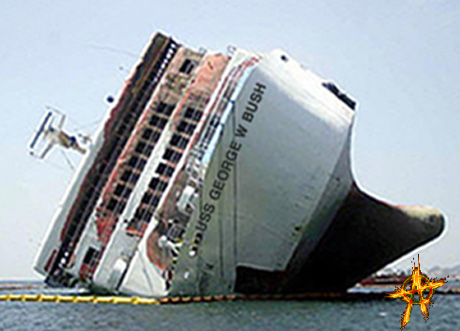
2001 Flashback
The United States of Oil
No administration has ever been more in bed with the energy industry -- but does that mean Big Oil is calling Bush's shots? First of two parts.
By Damien Cave
Nov. 19, 2001
The Bush administration's ties to oil and gas are as deep as an offshore well. President George W. Bush's family has been running oil companies since 1950. Vice President Dick Cheney spent the late '90s as CEO of Halliburton, the world's largest oil services company. National Security Advisor Condoleezza Rice sat on the board of Chevron, which graced a tanker with her name. Commerce Secretary Donald Evans was the CEO of Tom Brown Inc. -- a natural gas company with fields in Texas, Colorado and Wyoming -- for more than a decade.
The links don't end with personnel. The bin Laden family and other members of Saudi Arabia's oil-wealthy elite have contributed mightily to several Bush family ventures, even as the American energy industry helped put Bush in office. Of the top 10 lifetime contributors to George W.'s war chests, six either come from the oil business or have ties to it, according the Center for Public Integrity.
"There's no denying that this is an oil administration," says Peter Eisner, managing director of the nonprofit, nonpartisan watchdog group that conducted the study of Bush's campaign finances. "You can't talk about the career of any George Bush -- father or son -- without talking about oil."
But talking is one thing; determining exactly how the ties to the oil industry affect domestic and foreign policy is another. How much influence does the oil industry have? Is the U.S. bombing Afghanistan in part because -- as antiwar critics have claimed -- the industry wants to clear a path for oil and gas pipelines? Will the Bush administration steadfastly avoid confrontation with Saudi Arabia -- home of 15 of the 19 suspected hijackers -- because it doesn't want to upset ExxonMobil and the other oil companies with a deep Saudi stake? Or, even more intriguingly, could the close ties between Bush and the Saudis lead to increased U.S. pressure on Israel to create a peace settlement?
Or is this too simplistic? Since at least World War II, the oil industry has often been forced by the U.S. government to serve foreign policy objectives, rather than the other way around. Presidents have generally accepted oil's economic significance, its role as the grease that makes capitalism go. But even the most conservative administrations have regularly emphasized geopolitical objectives -- Soviet containment, for example -- at the expense of oil industry interests. Aspects of Bush's energy plan suggest that even this administration will not break the give-and-take pattern.
The problem, however, is that this pattern, the so-called "cheap oil strategy" looks more and more like a failure. Foreign oil dependence has risen over the past decade while now -- with anti-American sentiment growing in the Arab world -- foreign oil supplies are looking increasingly insecure. More than ever, some kind of national policy pushing both conservation and the development of renewable energy resources seems eminently prudent, if not necessary.
And that's where the current makeup of the Bush administration becomes crucial -- not because Bush-Cheney and company plan to invade Iraq to make it safe for ExxonMobil, (although that's not totally beyond the bounds of possibility) but because these are the last men and women in the world to expect radical change from on questions related to energy. Their friends, finances, and world views are all oil-drenched.
George W.'s ties to oil don't prove that the industry decides our every foreign policy move. But they do just about guarantee, for all practical purposes, that nothing significant will change in American energy policy. With Bush-Cheney in power, oil addiction is here to stay.
http://archive.salon.com/tech/feature/2001/11/19/bush_oil/index.html
Next page | Oil: It's a Bush family affair
The fusion of oil and politics is a Bush family tradition. For generations, the Bushes and their friends have been shuttling back and forth between energy industry boardrooms and Washington's hallowed halls.
Bush's grandfather, Prescott Bush, initiated the pattern. Shortly before winning a Connecticut Senate seat in 1952 he helped his son George raise $350,000 to start what would become Zapata Petroleum.
Sen. Bush also regularly looked out for the oil industry and his son's interests while in Washington. His biggest single favor, according to Herbert Parmet's book "George Bush: The Life of a Lone Star Yankee," came a year into his first Senate term, when he opposed legislation that would have federalized offshore resources -- including oil -- to raise money for education. In the name of states' rights and free enterprise, the bill's defeat helped both the oil companies and gave Zapata just what it needed to expand. In fact, soon after the legislation failed, Zapata moved into offshore drilling -- eventually one of Zapata's most lucrative ventures
George Bush made millions during the '50s and '60s Texas oil boom, and he also made many friends, most notably James Baker, who became Bush's company lawyer in 1963 after Zapata merged with Penn to become Pennzoil.
Bush later brought his friends to Washington, first as a representative in the House, then as head of the Republican National Committee and finally as vice president and president. He didn't stock his administration as full of oilmen and women as his son has, but like Prescott Bush, he didn't mind doing the industry's bidding either. His most public act for oil came in 1981. While serving as Ronald Reagan's vice president, he departed from the White House's official stance and visited Saudi Arabia to plead for an end to sliding prices. Bush argued that he was simply trying to protect American security interests by protecting domestic producers, who have higher costs than their Persian Gulf counterparts. But higher prices had another benefit: by protecting domestic oil jobs, they helped shore up support in Texas for what would eventually become his successful 1988 presidential campaign.
Higher prices also directly helped Bush's son, George W. Bush. George W.'s oil career started in 1978 -- 12 years after his father first entered Congress -- when several of his father's friends invested in his firm, Arbusto ("Bush" in Spanish). Unlike his father, George W. spent much of his oil career in the red. As Joe Conason pointed out in Harper's last year before the election, the company's original investors and others bailed out his firm at least three times. But after a final act of corporate CPR -- a merger with Harken Energy in 1986 -- Bush's connections to power really paid off. Two years after the merger, Abdullah Taha Bakhsh, a former director of Saudi Arabia's income tax department, purchased an 11 percent stake in Harken through his company Traco International. That same year, Harken won a contract for oil-drilling in Bahrain.
"Harken had no international experience at the time," says Eisner at the Center for Public Integrity, which published a detailed account of Bush's rise to power titled "The Buying of the President: 2000." "It was their first out of country contract."
Press reports at the time questioned Bahrain's motivations. Even the normally reserved Wall Street Journal reported in 1991 that the contract "raises the question of ... an effort to cozy up to a presidential son."
The Bush family countered that the contract was well deserved. Regardless, the deal in the Persian Gulf gave Bush a direct tie to the Saudi elite and set Bush on a suddenly successful path.
"It's not just the matter of a single contract," Eisner says. "It also has to do with converting Harken into a player that was then converted into a stake in the Texas Rangers and a run for governor. It's not incidental. The Bahrain deal is central to Bush's life."
Some experts suggest that it's not necessarily a bad thing to have a presidential family so steeped in oil knowledge, given the importance of oil to both national security and the domestic economy. But Bush has shown a pervasive willingness to let oil interests define energy and environmental policy. After accepting millions from the industry during his run for governor, he signed into law tax breaks for state energy producers, and in 1997, he gave them a hand in writing their own rules. Upon hearing that Texas' state environmental agency planned to end an exemption that allowed power plants built before 1971 to avoid complying with state pollution laws, Bush tapped two people to come up with an alternative plan: Vic Beghini, an executive with Marathon Oil Inc. and Ansel Condray, an executive with Mobil.
The plan they came up with initiated a voluntary pollution reduction program that didn't punish companies for noncompliance and thus essentially failed. A study by the Environmental Defense Fund published six months after Bush announced the program revealed that only three of the 26 companies had actually cut their emissions. Two years later, under increasing public pressure, Bush signed a bill forcing power plants to cut their emissions in half by 2003 -- but the essential exemption, as the industry wanted, still stands.
http://archive.salon.com/tech/feature/2001/11/19/bush_oil/index1.html
Next page | The Condoleezza Rice-Chevron-Central Asia connection
The politicos surrounding Bush also have enjoyed warm government/oil-industry connections. While Bush used his elected position to help friends in his former industry, Cheney employed past government connections to improve his own bottom line.
Iraq provides the most dramatic example. Cheney, intentionally or inadvertently, went against his own edicts in order to pad his company's profits. He told Sam Donaldson in August 2000 that, as the head of Halliburton, "I had a firm policy that I wouldn't do anything in Iraq, even arrangements that were supposedly legal." And yet, as the Financial Times eventually proved, Cheney oversaw $23.8 million in sales to Iraq in 1998 and 1999. Cheney, who collected a $36 million salary before becoming vice president, essentially profited from the destruction of Iraq that he oversaw as secretary of defense during the Gulf War. And while the oil-rig and equipment sales were legal -- a 1998 U.N. resolution gave Iraq the right to rebuild its oil industry -- Cheney's firm sold through European subsidiaries "to avoid straining relations with Washington and jeopardizing their ties with President Saddam Hussein's government," according to a November 2000 Financial Times report.
Cheney also helped Halliburton obtain a windfall of U.S. government loans. He secured $1.5 billion in taxpayer-backed financing for Halliburton -- a massive increase over the $100 million loan it received during the five-year period before Cheney took over. And while Cheney has claimed that Halliburton's rise to power had nothing to do with his political stature, State Department documents obtained by the Los Angeles Times suggest that U.S. officials assisted Halliburton both in Asia and Africa. Even the domestic defense-contracting arm of Halliburton -- Brown & Root -- saw its fortune change drastically once Cheney took over. The company booked $1.2 billion in contracts between 1990 and 1995; with Cheney at the helm, contract awards spiked to $2.3 billion between 1995 and 2000.
Other Bush administration officials have also profited from past government experience and influence. Bush's father and his then Secretary of State James Baker -- the lawyer who fought for Bush during the Florida election fiasco -- work for the Carlyle Group, an investment firm that until recently collected investments from the bin Laden family and other members of the Saudi elite. Reagan's Secretary of State George Schultz sat on the board of Chevron before the arrival of Condoleezza Rice.
Rice joined the Chevron board in 1991, after serving for a year on Bush Sr.'s National Security Council. There, she earned a $35,000 annual retainer, $1,500 for every meeting she attended and stock options worth hundreds of thousands of dollars, according to SEC documents. She was reportedly hired for expertise in the former Soviet states, and long before U.S. planes started dropping bombs in nearby Afghanistan, she spent much of her time at Chevron working on prospective deals in the Caspian region. Chevron (with Mobil) already produces 70 percent of the oil coming out of the Tengiz oil field in Kazakhstan, according to Ahmed Rashid's book, "Taliban," and the company has been working hard to secure a pipeline that would allow more oil to be produced. In 1993, with Rice on the board, the company pulled together a pipeline project to carry oil to a Russian port on the Black Sea. Russian opposition eventually postponed the plan indefinitely but Chevron still holds a 45 percent stake in the project -- and given the present state of improved Russian-American relations, many suspect that project will eventually get off the ground.
The slowly improving relations between the U.S. and Iran could also help Chevron. When negotiations over pipelines from Tengiz broke down a few years ago, Chevron turned its focus toward the Islamic theocracy, asking the Clinton State Department for a "swapping" license. Approval would have allowed oil from Tengiz to be shipped across the Caspian to Iran while, in exchange, Chevron would be able to sell an equal amount of Iranian oil that would be shipped from the Persian Gulf. The proposal was never approved, but given Rice's ties, many have suspected that Chevron will soon play a larger role in American foreign policy, whether in Iran or the Caspian.
Critics of the Bush administration point out that a stabilized Caspian region could benefit Rice's friends at Chevron, and if she returns to the board, Rice herself. They also argue that maintaining dependence on Saudi oil could benefit Cheney's old firm and Bush's father, and ultimately, the president himself when an inheritance comes his way.
But there is no clear evidence, right now, of oil company desires affecting current U.S. foreign policy. If anything, the terrorist attacks have reduced the energy industry's influence. Before Sept. 11 Saudi Arabia was reportedly pushing the U.S. to pressure Israel into Palestine peace concessions and, according to a Newsweek story, Bush was beginning to comply. But after Sept. 11, the chance that the U.S. would accede to Saudi requests evaporated, given the numerous Saudi connections to the attacks.
In that sense, the trajectory of oil influence over foreign policy has continued upon its historical path. A review of the evidence suggests that over time, the oil industry has progressively lost power. But that still doesn't mean that the current administration is likely to do anything radical to alter U.S. dependence on foreign oil -- barring the unlikely event of Bush pulling a Nixon-visit-to-China shock, and using his oil ties to force a real commitment to renewable energy and conservation.
Tuesday: George Bush may not be a puppet, but he's no groundbreaker either.
http://archive.salon.com/tech/feature/2001/11/19/bush_oil/index2.html
Source: http://groups.google.com/group/misc.activism.progressive/
Investigate Cheney's
Secret (OIL) Energy Deals
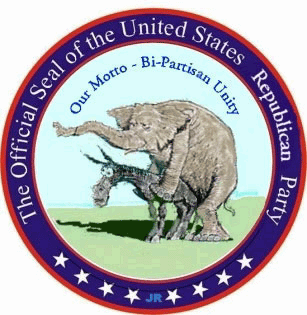
Republican "Contract With
America"
What a
lying crock of Poo
October 3, 2005 by Balz
As Republican Members of the House of Representatives and as citizens seeking to join that body we propose not just to change its policies, but even more important, to restore the bonds of trust between the people and their elected representatives.That is why, in this era of official evasion and posturing, we offer instead a detailed agenda for national renewal, a written commitment with no fine print.
This year's election offers the chance, after four decades of one-party control, to bring to the House a new majority that will transform the way Congress works. That historic change would be the end of government that is too big, too intrusive, and too easy with the public's money. It can be the beginning of a Congress that respects the values and shares the faith of the American family.
Like Lincoln, our first Republican president, we intend to act "with firmness in the right, as God gives us to see the right." To restore accountability to Congress. To end its cycle of scandal and disgrace. To make us all proud again of the way free people govern themselves.
On the first day of the 104th Congress, the new Republican majority will immediately pass the following major reforms, aimed at restoring the faith and trust of the American people in their government:
- FIRST, require all laws that apply to the rest of the country also apply equally to the Congress;
- SECOND, select a major, independent auditing firm to conduct a comprehensive audit of Congress for waste, fraud or abuse;
- THIRD, cut the number of House committees, and cut committee staff by one-third;
- FOURTH, limit the terms of all committee chairs;
- FIFTH, ban the casting of proxy votes in committee;
- SIXTH, require committee meetings to be open to the public;
- SEVENTH, require a three-fifths majority vote to pass a tax increase;
- EIGHTH, guarantee an honest accounting of our Federal Budget by implementing zero base-line budgeting.
Thereafter, within the first 100 days of the 104th Congress, we shall bring to the House Floor the following bills, each to be given full and open debate, each to be given a clear and fair vote and each to be immediately available this day for public inspection and scrutiny.
1. THE FISCAL RESPONSIBILITY ACT: A balanced budget/tax limitation amendment and a legislative line-item veto to restore fiscal responsibility to an out- of-control Congress, requiring them to live under the same budget constraints as families and businesses.
2. THE TAKING BACK OUR STREETS ACT: An anti-crime package including stronger truth-in- sentencing, "good faith" exclusionary rule exemptions, effective death penalty provisions, and cuts in social spending from this summer's "crime" bill to fund prison construction and additional law enforcement to keep people secure in their neighborhoods and kids safe in their schools.
3. THE PERSONAL RESPONSIBILITY ACT: Discourage illegitimacy and teen pregnancy by prohibiting welfare to minor mothers and denying increased AFDC for additional children while on welfare, cut spending for welfare programs, and enact a tough two-years-and-out provision with work requirements to promote individual responsibility.
4. THE FAMILY REINFORCEMENT ACT: Child support enforcement, tax incentives for adoption, strengthening rights of parents in their children's education, stronger child pornography laws, and an elderly dependent care tax credit to reinforce the central role of families in American society.
5. THE AMERICAN DREAM RESTORATION ACT: A S500 per child tax credit, begin repeal of the marriage tax penalty, and creation of American Dream Savings Accounts to provide middle class tax relief.
6. THE NATIONAL SECURITY RESTORATION ACT: No U.S. troops under U.N. command and restoration of the essential parts of our national security funding to strengthen our national defense and maintain our credibility around the world.
7. THE SENIOR CITIZENS FAIRNESS ACT: Raise the Social Security earnings limit which currently forces seniors out of the work force, repeal the 1993 tax hikes on Social Security benefits and provide tax incentives for private long-term care insurance to let Older Americans keep more of what they have earned over the years.
8. THE JOB CREATION AND WAGE ENHANCEMENT ACT: Small business incentives, capital gains cut and indexation, neutral cost recovery, risk assessment/cost-benefit analysis, strengthening the Regulatory Flexibility Act and unfunded mandate reform to create jobs and raise worker wages.
9. THE COMMON SENSE LEGAL REFORM ACT: "Loser pays" laws, reasonable limits on punitive damages and reform of product liability laws to stem the endless tide of litigation.
10. THE CITIZEN LEGISLATURE ACT: A first-ever vote on term limits to replace career politicians with citizen legislators.
Further, we will instruct the House Budget Committee to report to the floor and we will work to enact additional budget savings, beyond the budget cuts specifically included in the legislation described above, to ensure that the Federal budget deficit will be less than it would have been without the enactment of these bills.
Respecting the judgment of our fellow citizens as we seek their mandate for reform, we hereby pledge our names to this Contract with America.

Tony Snow On President Bush:
‘An Embarrassment,’ ‘Impotent,’
‘ Doesn’t Seem To Mean What He Says’
Think Progress
http://thinkprogress.org/2006/04/25/snow-on-bush
The many falsehoods of Tony Snow
Media Matters for America
http://mediamatters.org/items/200604190003
Citizens for Legitimate Government
http://www.legitgov.org/index.html#breaking_news

Ahankara (lit., "I do") - the ego-principle is the root cause of dualism or the seeming separation between people and their creator.
Ahankara brings human beings under the sway of maya (cosmic delusion), by which the subject (ego) falsely appears as object; the creatures imagine themselves to be creators.

MEDICAL INSURANCE EXPLAINED
Q. Mr. Bush, What does HMO stand for?
A. This is actually a variation of the phrase, "HEY MOE." Its roots go back to a concept pioneered by Moe of the Three Stooges, who discovered that a patient could be made to forget the pain in his foot if he was poked hard enough in the eye.
Q. Mr. Bush, I just joined an HMO. How difficult will it be to choose the doctor I want?
A. Just slightly more difficult than choosing your parents. Your insurer will provide you with a book listing all the doctors in the plan. The doctors basically fall into two categories: those who are no longer accepting new patients, and those who will see you but are no longer participating in the plan. But don't worry, the remaining doctor who is still in the plan and accepting new patients has an office just a half-day's drive away and a diploma from a third world country.
Q. Mr. Bush, Do all diagnostic procedures require pre-certification?
A. No. Only those you need.
Q. Mr. Bush, Can I get coverage for my preexisting conditions?
A. Certainly, as long as they don't require any treatment.
Q. Mr. Bush, What happens if I want to try alternative forms of medicine?
A. You'll need to find alternative forms of payment.
Q. Mr. Bush, My pharmacy plan only covers generic drugs, but I need the name brand. I tried the generic medication, but it gave me a stomach ache. What should I do?
A. Poke yourself in the eye.
Q. Mr. Bush, What if I'm away from home and I get sick?
A. You really shouldn't do that.
Q. Mr. Bush, I think I need to see a specialist, but my doctor insists he can handle my problem. Can a general practitioner really perform a heart transplant right in his/her office?
A. Hard to say, but considering that all you're risking is the $20 co-payment, there's no harm in giving it a shot.
Q. Mr. Bush, Will health care be different in the next century?
A. No, but if you call right now, you might get an appointment by then.
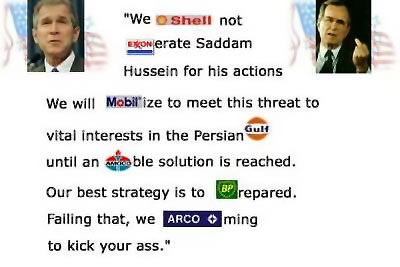
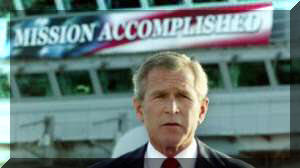
![]()
![]()
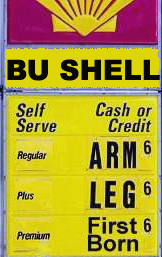
There's no denying that this is an oil administration, you can't talk about the career of any George Bush -- father or son -- without talking about oil. - Peter Eisner

May 15, 2001
Halliburton And KMNF [Azerbaijan] Ink 12 Year Caspian Contract
Halliburton International Inc. and KASPMORNEFTELOT (KMNF), the marine division of the State Oil Company of Azerbaijan Republic (SOCAR), have entered into a 12-year contract for a marine base and associated services to support Halliburton Sub sea offshore construction activity in the Caspian region. Halliburton Sub sea is a business unit of Halliburton Company’s Energy Services Group.
The base, with a 6,000-square metre lay down area, is located at KMNF’s Southern Basin adjacent to Caspian Shipyard. It will be primarily utilized to support Halliburton Sub sea’s catamaran crane vessel Qurban Abbasov (previously known as the Titan 4) during the restoration and upgrade of the vessel and during the forthcoming offshore construction, pipe lay and sub sea activities.
The site will also be developed to provide warehouse, office and training facilities that will include advanced diver and life support technician training, utilizing the company’s 16-man modular saturation system.
The Qurban Abbasov is operated by Halliburton Sub sea in an alliance agreement with SOCAR for a period of 12 years.
It will provide an advanced, stable, dynamically positioned construction platform for saturation and remote vehicle diving; flexible and bundle pipeline installation with trenching; emergency pipeline repair, subsurface well intervention with wire line; and coiled tubing.
It also will be used in flotel configuration for hook-up and commissioning work. "'The acquisition of the marine base is a further indication of our commitment to the Caspian region and to the success of the partnership arrangements with SOCAR,' says Edgar Ortiz, President and Chief Executive Officer, Halliburton’s Energy Services Group."
--Aylward, Marine Publishers and Halliburton Press Release, May 15, 2001.
[NOTE: The original
documents are currently missing and here were their link addresses:
http://www.aylward.co.uk/story1.htm
http://www.halliburton.com/ESG/ESGNWS/ESGNWS_051501.asp
Another interesting point is this contract runs
out in 2013 and perhaps why Iran is of interest?]
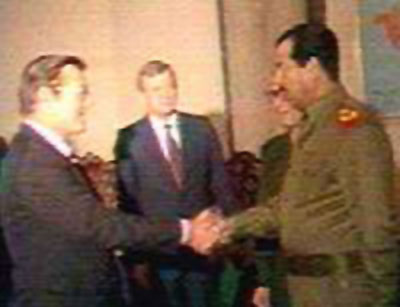
August. 6, 2001
PDB Memo where Rice tells Bush,
Bin Laden Determined to Strike in U.S.
USING PLANES!
This information surfaced, ONLY, when Rice was forced to reveal the name of the document during the investigation of 9/11 and, just so everybody knows, the majority of her testimony was NOT under oath [click to read].
Sympathy for the Denial

[Click Above Graphic to Play Short Flash]
A Night with Ann Coulter
http://www.youtube.com/watch?v=KmLJDrsaJmk&mode=related&search
[Via Dial-up, the above will take about
an hour to download.]




